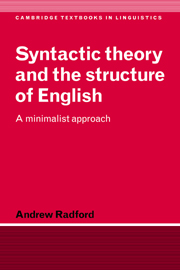7 - Operator movement
Published online by Cambridge University Press: 05 June 2012
Summary
Overview
In the previous chapter, we looked at a particular kind of movement operation found in English, called head movement. In this chapter, we look at a very different kind of movement operation, known as operator movement because it applies to expressions which contain an (e.g. negative or interrogative) operator of some kind. Our discussion in the text will be concerned solely with interrogative operators (though we shall look at other types of operator construction in the exercises).
Wh-operators
To get our discussion underway, consider the syntax of the following wh-questions (i.e. questions containing an interrogative wh-word):
(a) What languagescan you speak?
(b) Which roadshould we take?
(c) Wherewere you going?
(d) Whohave they arrested?
Each of the sentences in (1) contains an (italicized) inverted auxiliary occupying the head C position of CP, preceded by a (bold-printed) interrogative expression. Each of the bold-printed pre-auxiliary phrases contains an interrogative operator (viz. what?, which?, where? or who?). Expressions containing an operator are – for obvious reasons – called operator expressions; hence what languages?, which road?, where? and who? are all (interrogative) operator expressions in (la–d).
It seems clear that each of the operator expressions in (1) functions as the complement of the verb at the end of the sentence. One piece of evidence leading to this conclusion comes from the fact that each of the examples in (1) has a paraphrase in which the operator expression occupies the canonical (i.e. ‘typical’) complement position after the relevant verb: cf.
(a) You can speak what languages?
(b) We should take which road?
Information
- Type
- Chapter
- Information
- Syntactic Theory and the Structure of EnglishA Minimalist Approach, pp. 267 - 314Publisher: Cambridge University PressPrint publication year: 1997
